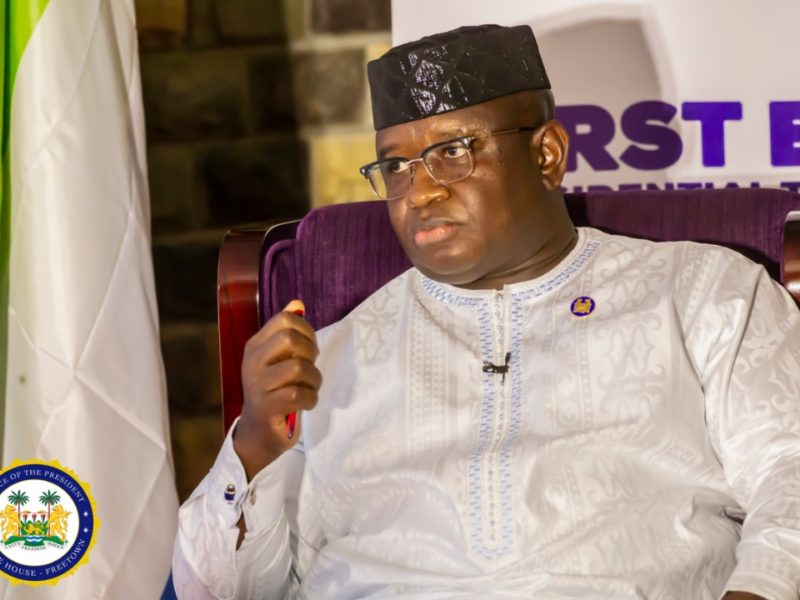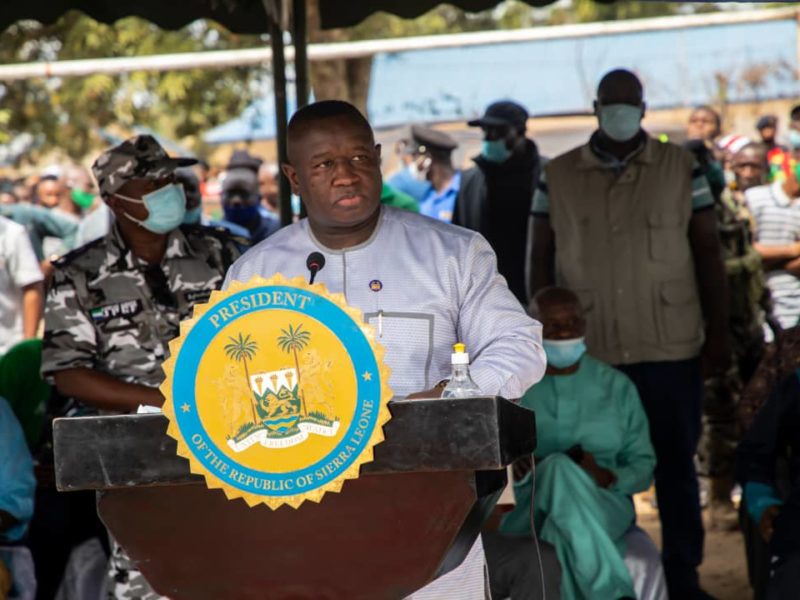The Yele experiment …
I was fortunate to be part of President Ernest Bai Koroma’s entourage over the weekend as he concluded a conducted tour of Lion Heart Foundation Development Projects in agriculture, health, water and energy implemented in Yele (the center of Sierra Leone), Gbonkolenken Chiefdom. (Photo: Jarrah Kawusu-Konte)
Nedoil Limited is a Sierra Leone based entity, established in 2007 to build and operate a new oil palm and soap factory in Yele. The objectives of the project are to support health projects and other initiatives of Lion Heart Foundation and improve the living standards of 1,500 smallholder farmers. The concept is aimed at integrating business and development that will not only bring direct benefit to farmers, but also enhance their food productions.
Out-growers have been engaged in a micro-credit scheme that seeks to provide smallholder farmers with a ready market by buying all produce from the farmers, thereby providing cash directly to the smallholders, consistent with government’s current efforts to transform farming into a commercial activity.
The General Manager of Nedoil, Madam Maria Simco, said oil palm fruits supplied to the oil mill were 98% produced by the farmers within ten mile radius, while adding that the programme started in 2008. Maria Simco maintained that, the programme provided a package of technology of oil palm seedling and training to 1,500 participating farmers and cash loan interest free, payable in one year with 30% percent deducted from their sales as payback for their loan for every delivery.
To demonstrate their commitment to the development of the communities and identify positively with government’s “Agenda for Change”, their business efforts for the development of the area are designed to empower farmers and transform their lives. But this is a unique approach to business because it provides direct benefits to the communities and above all, their efforts are sustained through the direct participation of the population, while the business activities feed into the development efforts.
Madam Simco further briefed the President that Nedoil established a 45 hectare oil palm plantation in 2006, and in 2008, 80,000 improved oil palm variety seedlings were nursed and distributed to participating farmers. To date, she disclosed that Nedoil has established 32 improved variety oil palm seedlings distributed to 1,040 farmers in 2008 at Gbonkolenken Chiefdom.
According to the General Manager, Maria Simco, the oil mill was established in May 2008 and was officially opened in November 2008 with a capacity of three Metric tons per hour. She maintained that the current maximum capacity creates direct employment of fifty people, adding that “the waste palm oil is used to manufacture soap and the palm oil effluent and press cake were used as fertilizers to the plantations”. The General Manager maintained that the creation of the mill stimulates smallholder farmers to maintain and expand their existing plantations as the mill provides direct market for their oil fruits.
She informed President Koroma that Nedoil supported farmers in marketing their oil palm fruit by providing them with free transport and buying teams in their villages, while adding that tools and equipment and technical expertise to repair feeder roads, local bridges and the Yele ferry boat in collaboration with the community are provided. The General Manager also revealed that farmers had been provided with health programmes as well as football equipment to youths and children.
Also taking President Koroma through the Lion Heart Medical Centre, Dr Erdi of the center said in 2010, the Lion Heart Foundation constructed a clinic next to its Nedoil Palm oil factory in Yele, Gbonkolenken Chiefdom, Tonkolili District, and since the building was completed it had served as a basic first aid health facility, mainly for the Nedoil Limited employees. She however noted that, in September 2011 the clinic opened its doors to the entire community as an outpatient medical facility and under five clinic with minimal local staff.
Dr Erdi noted that the medical center aimed at providing affordable and quality health care to the people of Gbonkolenken chiefdom, saying the clinic has among others, provision for inpatients with a total capacity of fifteen beds, a maternity/delivery room with ultrasound scan, dispensary and an operating theatre. She further disclosed that plans are being made to expand the clinic into a full size hospital over the coming years as the distance to other hospitals from Yele was a real threat to access proper health care for the community.
Chairman and Country Operations Officer, Donald Keus, said the Lion Heart Foundation facilitated projects such as the rehabilitation of the Yele Hydro-electric power station, construction of a multi-business centre (E-Luma) in Yele, rehabilitation of the Yele Water Treatment System, which would be completed in May 2012 and Lion Heart Medical Centre. He added that scholarships are being awarded to Primary and Secondary School children since 2009 and that the SDA Secondary School and boarding home were also rehabilitated and well furnished.
The president became so moved by this approach that he declared openly that his government would consider the Yele project as a pilot, which would be replicated to other parts of the country with adjustments to suit local conditions. He described the efforts of Lion Heart Foundation as an integrated approach to develop the community, noting that such an integrated approach was only undertaken by government. He assured them of his personal support and that of government to ensure that they realize their dream of enhancing the status of the people of Yele and Gbonkolenken chiefdom as a whole.
The use of the oil palm plantation as a vehicle to promote development in Gbonkolenken chiefdom is quite instructive as it is consistent with government’s policy for the agricultural sector to become the engine for socio-economic development in Sierra Leone.
The Agricultural Development Assets provided by government to Tonkolili District worth over ten billion Leones will therefore accelerate this process for the benefit of the people in all parts of the country, which will also receive the same input in line with their agricultural activities.
This business model is obviously worthy of emulation as it demonstrates long term commitment to both the people and the economy as a way to fully exploit the opportunities created by government for both local and international investors.
By Jarrah Kawusu-Konte
Stay with Sierra Express Media, for your trusted place in news!
© 2012, https:. All rights reserved.






Kons
/
where u part of delegation as of president as what? as brown envelope politican or commentator? yes or know
14th March 2012